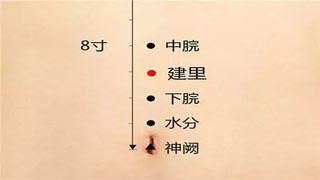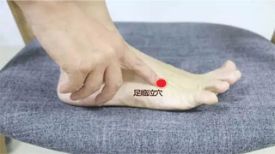
Jianli, the name of the acupoint. The First and Second Classics of acupuncture and moxibustion and Moxibustion were published. The meaning of 'built with a place' refers to a dwelling. This acupoint is located in the stomach and is mainly used for treating stomach diseases. It can regulate the spleen and stomach, stabilize the abdomen, and is named Jianli.
【 Guijing Positioning 】Gui Jing: Belongs to the Ren meridian.
Positioning: On the front midline, 3 inches above the navel.
【 Functions and Indications 】
Function: Regulating the spleen and stomach, eliminating accumulation and resolving stagnation.
Indications: Stomach pain, abdominal pain, bloating, nausea and vomiting, non appetite, body swelling, gastric dilation, gastric ptosis, gastric ulcer, abdominal muscle spasm.
Clinical Application
1: Moisturizing with Yangling Spring and Yinling Spring, strengthening the spleen and dispelling dampness, treating bloating and edema.
2: Paired with Neiguan, regulating qi and stomach, treating stomach pain and vomiting.
3: Jianli acupoint combined with Neiguan and Gongsun to treat stomach pain.
4: Combining Jianli acupoint with Waiwan, Zusanli, and Tianshu to treat bloating and indigestion.
5: Jianli acupoint is combined with water from Taixi and Zhaohai to treat edema.
6: Jianli is infused with water, which has the effects of promoting qi circulation, promoting diuresis, and harmonizing the stomach. It is mainly used to treat abdominal swelling and nausea.
7: Jianli is paired with Neiguan, which has the effect of harmonizing the stomach and widening the middle. It is used to treat chest distress and hiccups.
8: Jianli Pei Zhongwan has the function of dispersing qi, dispelling dampness, and removing stagnation. It is mainly used for treating cholera, intestinal sounds, abdominal pain, bloating, and sudden ascending qi.
9: Jianli is equipped with an internal gateway to alleviate the distress in the chest.
The Jianli acupoint is mainly used in modern clinical practice to treat spleen and stomach diseases, such as epigastric pain, acute gastritis, chronic gastritis, gastric neurosis, gastric ptosis, indigestion, abdominal distension and swelling, abdominal pain and bowel sounds, peritonitis, rectus abdominis spasm, stomach pain, vomiting, loss of appetite, abdominal distension, edema, epigastric pain, abdominal pain, bowel sounds, true heartache, chest tightness, fullness, abdominal pain, diarrhea, non appetite, body swelling, gastric dilation, gastric ulcers, abdominal muscle spasms, etc.


